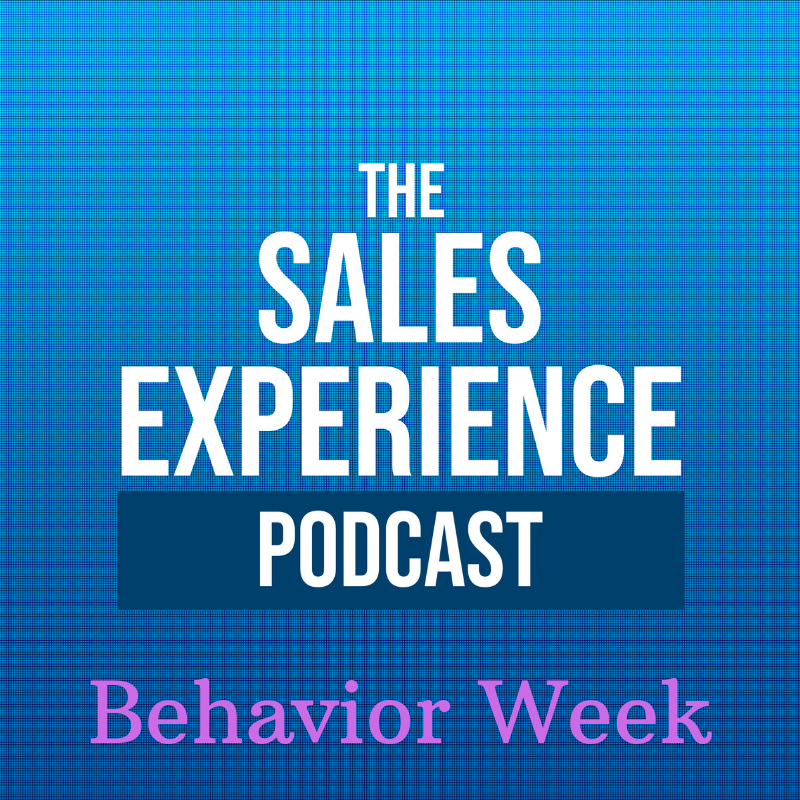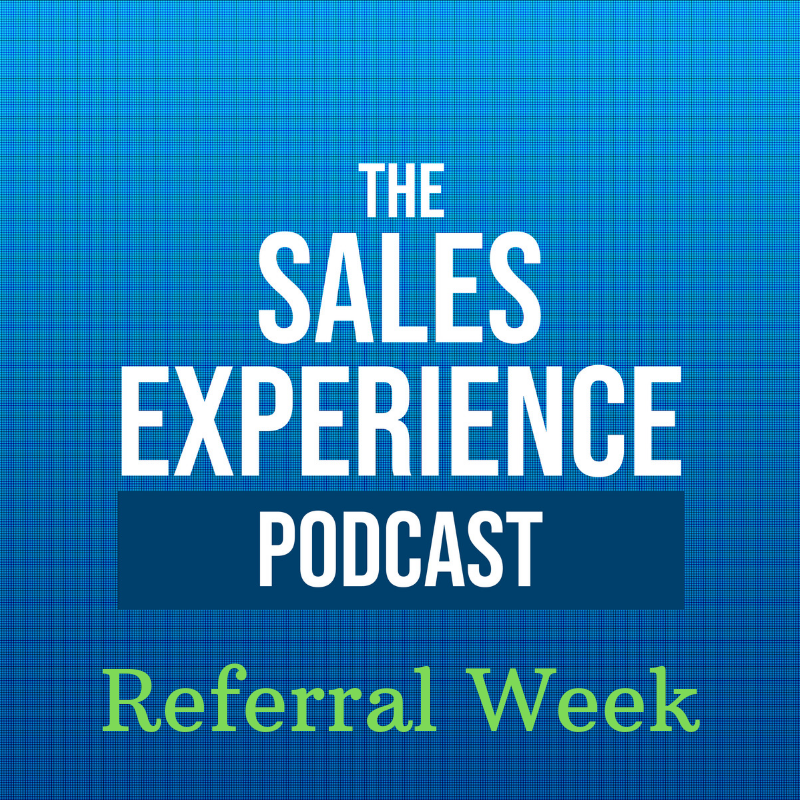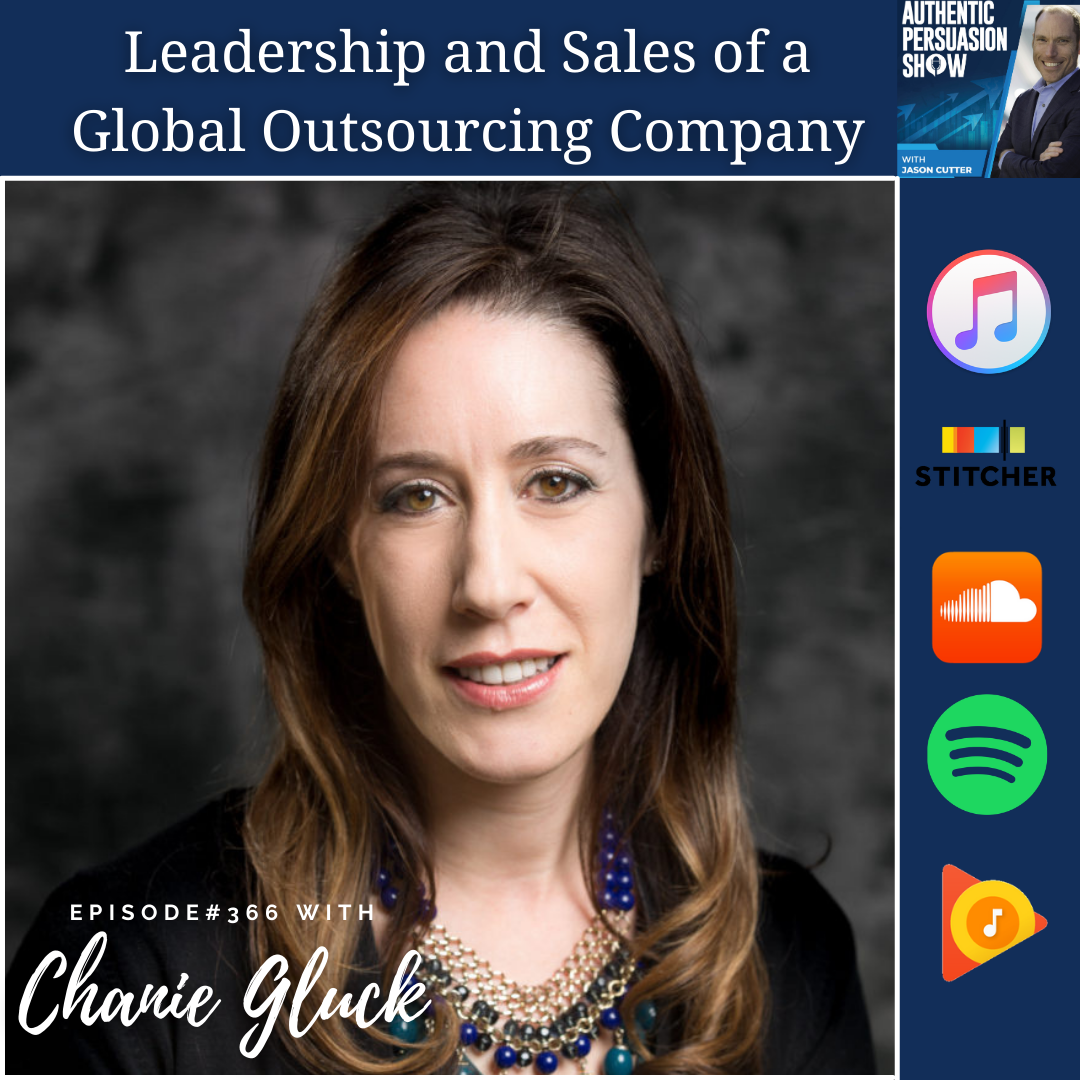Show Notes
This is the fourth segment of the conversation I had with Bill.
In Part 4, Bill and I talk about:
- Success comes when you are always growing and learning
- Bill’s version of a Great Sales Experience
- Healthy tension…necessary for sales people and their coaches, and sales people and their prospects
- Bill’s 4 steps for achieving great results with your sales
Download The Power of Authentic Persuasion ebook
Enroll in the Authentic Persuasion Online Course
Connect with Jason on LinkedIn
Connect with Bill on LinkedIn
Bill’s Bio:
William Eckstrom is the President and founder of the EcSell Institute. Bill has spent his entire career in the sales arena; the first 14 years in personal production and then 13 in various sales leadership roles. His management career began in 2000 as a District Manager for a medical equipment company and was promoted to U.S. Director of Sales in 2003. In 2004, Bill was lured away to become Senior Vice President of Business Development for a publicly-traded healthcare organization. In 2008, he founded the EcSell Institute to fill a void he witnessed and personally experienced in the sales leadership profession.
Bill presented a TEDx Talk to an audience of over 1,700 at the University of Nevada, Reno where he shared life-altering, personal and professional development ideas through the introduction of the “Growth Rings.” Since the release of the Talk, it received 100,00 views in just one week and now has over 3,000,000 views.
Most recently Bill helped co-author The Coaching Effect: What great leaders do to increase sales, enhance performance, and sustain growth which became an Amazon-Best Selling book in it’s first week of launching.
As a result of his experiences, his company’s findings, and his public speaking skills, Bill’s work as a keynote speaker is highly regarded throughout North America. While his audiences call him “profoundly authentic”, “highly entertaining” and much more, Bill is most proud of the fact his material is based on EcSell’s science and research—he does not present motivational fluff. He has presented to hundreds of groups ranging in size from 25-2,500 on topics found on his personal website, billeckstrom.com.
Lincoln, Nebraska is home for Bill and his wife. Together they have three children, Will Jr, Claire and Maddie. Philanthropically, Bill prefers a very hands-on approach as evidenced by his current involvement and passion–working and training their Yellow Labrador, Aspen, for therapy dog work. Soon he and his four-legged companion will be visiting children in hospitals and senior citizens in nursing home settings. Bill also has a strong need to be in the outdoors and finds time each year to spend in field and stream with his children and close friends.
Bill’s Links:
EcSell’s website: https://www.ecsellinstitute.com/
Bill’s bio: https://www.ecsellinstitute.com/bill-eckstrom
E186 – Transcript
Jason: Alright. Welcome back to the sales experience podcast. Welcome back to the final part of my conversation with Bill Eckstrom. So glad that you’re here. Thank you for tuning in. If you haven’t, make sure you listen to the previous 3 parts. So part one through three. The last three days where Bill and I are talking about coaching in terms of sales, leadership, sales management, where coaches can go wrong or sales managers can fail, where organizations and leaders, owners, executives will struggle if they don’t make the right decisions with managers and then hold them accountable, track everything and move everything forward. In this portion here, Bill and I have some interesting revelations that come up. I say something which I’ve never thought of before and it comes into play. Here we’re talking about salespeople and hobbies. Are you doing sales as a hobby or as a career? Similar to what you would do with any other hobby or sport or event. And also Bill breaks down his formula for what it looks like to be an effective coach. So he covers that and so here you go. Part four.
Bill: If I don’t want to grow the culture that should be on the team is like, you know, that is not acceptable culturally. No organization should say, Hey, we’re okay with our people not growing. I mean, what if you’re a salesperson? You know, if you’re working with the organization and some of the sales people come up and say, Hey, you know what, that new methodology you’re showing us, man, Jason, I just don’t have time. I really don’t want to change my behaviors to grow this year. How long would they last in an organization?
Jason: As long as it takes for everyone else to be on board and start performing and raising that bar up where they’re now the leftover remnants of the old way and no longer fit in with the organization. And I think it’s interesting to talk about
Bill: And that has to permeate everything, every level within an organization.
Jason: And I think it’s important to talk about relatives, right? Like you said, is that it’s not just about becoming that superstar. It’s about growth for that individual and where they want to go and what that growth means. That growth doesn’t mean like, okay, we’re going to grow. And you need to make $1 million or 100,000 or whatever it is for your role. It’s more growth for you as an individual because if you’re not growing, you’re dying, right? At some level and you know it’s philosophical and people kind of freak out. But if you’re not learning new things and growing and trying to develop or have better conversations or listened better, whatever that looks like in your role and in your life, you’re not doing that. You’re just kind of stagnant and just coasting through life. And for me, you know, on a fundamental level, I just think life is too short for that. That’s not the point of life to just coast. I look forward to the weekend and coast through the weekend and then go back to work and coast. Like that’s, there’s more to life than that.
Bill: This is or there isn’t. And I’ve in, my daughter was laughing at me not long ago because she said she’s going to put on my tombstone that growth only occurs in a state of discomfort.
Jason: Perfect. That’s great.
Bill: No, but that is so true now. We can’t live a life of discomfort and growth. I understand that. You know, we all have our orders, we all have the things that make us comfortable, that prepare us for those growth moments. But to not grow is really, you’re missing life. It’s just that simple. You’re just missing life.
Jason: Yeah. And then the other part, like, you know, using the golf analogy for example, is the top golfers. They know their numbers. Amateur golfers may or may not know their numbers. They usually do. They know some of them. They might not know all of them. And I think the real difference is, is if you’re going out and you’re just playing golf for fun and you don’t really keep track and you don’t really care, that’s a hobby. Not a profession, not a career, not a drive, not something that you really want to improve and get better at. Which is fine. Right? We all have hobbies, whatever it is, where I don’t need to be the best golfer in the world. I just like playing. It’s a fun hobby. I go on for some time with my friends and it’s just fun, right? Nothing wrong with that. However, there’s a lot of sales reps and managers who treat their career as a hobby where they don’t track the numbers, they don’t know the numbers. It’s equivalent to going out and playing some golf with your friends. They show up and they play sales with their friends and it’s more in hobby mode and most organizations tolerate it yet don’t get where they need to be because you know it’s operating in sales hobby mode.
Bill: You’re, I’m, I’m writing that down. What you just said, Jason, don’t treat your career as a hobby. I have, I just love how you said that and it’s spot on. Yeah, I’ll just leave it at that. I that’s very profound and I like that and I’m going to use that and I’ll give you credit.
Jason: Maybe credit at least the first couple of times and then you can take it as your own but that just literally, that just came to me as we’re talking about this because again, not everyone strives to be a top golfer or a top basketball player, right? Like I enjoy playing basketball. I will never be a top basketball player, like a professional. Nor if I had started early on maybe but maybe not. But I enjoy it. It’s a fun hobby. It’s interesting cause I still keep track of my stats when I play and like how many misses and how I’m doing. But it’s a hobby. It’s just something fun. I don’t care. And then business is different and there’s a lot of people who, you know don’t separate those and don’t have that drive.
Jason: So let’s talk about, cause I have some questions that I keep struggling to ask people but I knew this was going to happen with us.
Jason: I even told you in advance, we’re probably going to get on a roll. We’re going to talk about, you know, coaching and leadership and probably not even get to this, but let’s talk about real quick, give you an opportunity. What does a great sales experience look like? And you can talk about it from the salesperson kind of point of view or from how the company creates that or you know, a sales experience from a coach because a coach is now selling the sales people on that. If you want to keep it in that framework like what does a great sales experience mean to you?
Bill: You know, one of the things that, and it was actually our VP of sales use this term several years ago and he uses it frequently and I, and I love how he says it and he said the most impactful, positive experiential asset you can give a salesperson is a great coach. And that hit me right between the eyes because he is spot on that you want to create a great experience for a salesperson, give him a great coach because that coach either you know, creates positive experiences or negative experiences. And keep in mind when I say that we don’t look at those as positive growth experiences as someone who is necessarily stress-free, happy, big kumbaya group hug event. That’s not how we measure growth. Positive growth experiences come at times of stress, positive growth experiences are induced. Sometimes stress is deliberately induced by great coaches to create growth. So I think the best experience you could ever give a salesperson is to give him a great coach and then understand what great coaching looks like, feels like. So you know the right one to bring forward.
Jason: And I think what’s fascinating because I look at the whole value chain, the whole org chart from the salesperson on up to the owner. And I think what’s interesting is that literally if we were to take the words that you just used about a coach with a sales person, with a sales professional, and instead replace coach with salesperson and then replace salesperson with customer or prospect, it’s also the same thing that creates that best experience for them. Like a really good salesperson is a coach that leads that prospect and consults them and figures out how they can win and what they need in their life and then coaches them to the finish line. And a salesperson who acts like a coach and a consultant, right? Cause this has always been my approach. And I help other people understand is that’s not always comfortable and cute and cuddly for the prospect.
Jason: I have said some things to some prospects out of love and concern and care as their coach and as a salesperson who wants to see them get over the finish line because they’re blinded by it or they’re either being ignorant to, you know, what’s in their way from getting from here to there, right? In that purchasing decision. And so literally, sometimes it’s tough talk. Sometimes it’s pushing buttons with the ultimate goal of that coach. And so I think the same topic, you’re covering coach to salespeople as salespeople to customers, you know, it’s the whole thing. It’s just, it’s a philosophy, right? Of all of it.
Bill: It is. And that’s a great analogy because we know, we measure it. One of the things that we see, one of the themes is what we call complexity or challenge, which is, are you creating a healthy tension basically between you and your salesperson as a coach? Because growth only occurs in this state of discomfort. We know that. Are you moving them outside of the comfort zones? Do you understand what, how that’s unique teacher, those people and are you maximizing that for each person? Just like it takes for great salesperson to adapt to the uniqueness of each customer? It’s done the exact same way. Why people don’t carry that when they move into a coaching role. We don’t know. All we know is that most don’t. Our director research calls a management paradigm.
Jason: Yeah, it’s definitely something. It’s a management something that’s for sure. Right. So before we wrap up, anything else? I’ll let you up the last word in this kind of conversation about coaching leadership. You know, just anything else we might’ve missed or not covered in our time.
Bill: Thank you. By the way, for that opportunity. What I would tell people is follow all 4 steps. Number one is measure. If you’re really wondering what to do by your coach, measure how good your leadership team is today. Number two, train and educate them or develop them and educate them. I know training is an odd word at times, but to measurement that not give them the opportunity to improve is shame on you and shame on them. So first step, measure, second step, develop and try and educate. Third step is to implement. Don’t ever do those things. Trainees walkway. I’m sure you see it all the time in your business, which training is one thing, but training and then having an accountability partners, having deadlines and all along the way to make sure the behaviors that you’re training to, get implemented and the last step for set, being track and analyze. Take a look back and see what’s happening, what needs to be tweaked and then rinse and repeat. Do whatever year.
Jason: Perfect. That’s it. That’s the formula right there. No matter what you’re working on in sales and business, in life, anything that you want to improve and optimize, maximize. I mean that’s it. That’s the four steps for sure.
Bill: Thank you.
Jason: Thank you Bill. And I’m going to put all of your information in the show notes so people have your links information. But for now for people to saying, where’s the best place from the find you, your business, you know, the stuff that you’ve done, anything you know, anything of value that you’ve created, like where’s some good places to find that?
Bill: Oh well thank you. So billeckstrom.com our company’s website is ecsellinstitute.com so that’s E C S E L L thank you for asking about our book. Our book just released in April’s hit the bestseller list. It’s called the coaching effect and we’re really, really proud of that. So that’s a fun thing to always bring up. And if there’s questions on this whole discomfort thing, as I said earlier, I did a Ted talk called white comfort will ruin your life and that’s of course can be seen on YouTube. And that talk went viral the year it was really. So that’s really been a fun thing as well. So I think those four ways and of course linkedin, I love connecting with people on LinkedIn. That’s always a good time. And again, I’m Bill Eckstrom, my LinkedIn, Instagram, I’m out there, all the usual social media places, Twitter, so on and so forth.
Jason: Very cool. Well thank you Bill. Uh, again for being on here and talking about sales and coaching and leadership. I appreciate that and what you are doing and kind of both are similar focus on, you know, helping improve sales organization. So I appreciate that. Thanks for being here.
Bill: Yeah. Jason, I got to tell you, the only reason these things are fun is when you get asked great questions. And you ask great questions. You certainly walk the talk. I’m sure of what you’re training people. So I appreciate you my friend.
Jason: I sort of had a plan, but it’s all about going in the flow and making value. So I appreciate that. And for everyone listening again, make sure to go to cutterconsultinggroup.com you can find the episode and all of Bill’s links as well as the transcription for this. And as always, keep in mind that everything in life is sales and people remember the experience you gave them.
![[E186] The Coaching Effect with Bill Eckstrom – Part 4 of 4](https://episodes.castos.com/salesexperiencepodcast/images/Bill-Eckstrom-Cover-Image.png)


